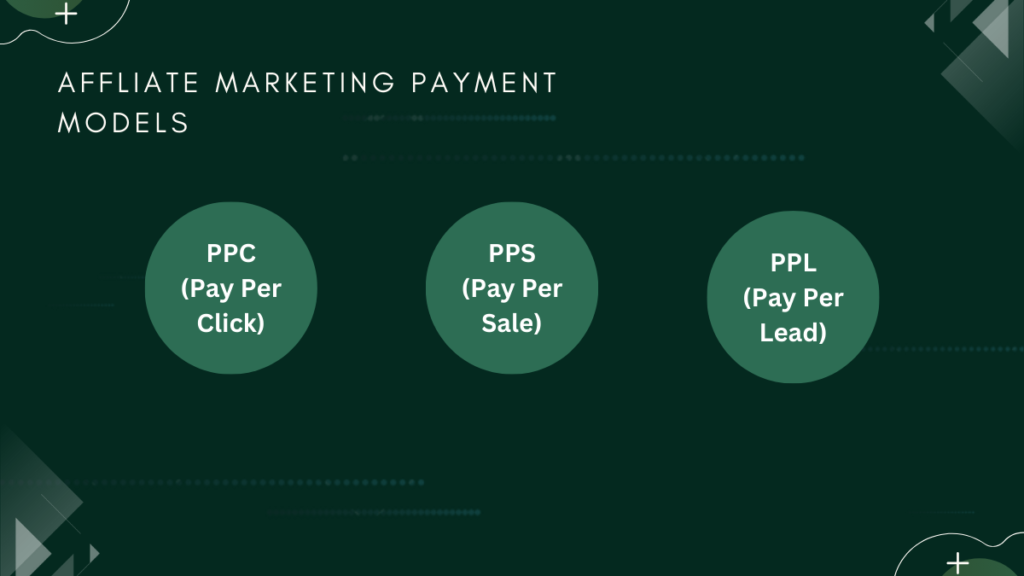
Introduction
In today’s digital age, the realm of affiliate marketing stands as a promising avenue for individuals seeking financial independence and entrepreneurial success.
With the power of the internet, anyone can harness the potential of affiliate marketing to generate income and create a sustainable online business.
This comprehensive guide will delve into the intricacies of affiliate marketing, elucidating the strategies, tools, and tips to help you navigate this dynamic landscape and maximize your earnings.
Understanding Affiliate Marketing
Affiliate marketing involves a partnership between a merchant and an affiliate (you), wherein you promote the merchant’s products or services through unique affiliate links.
When a customer makes a purchase via your referral link, you earn a commission, making it a performance-based model.

PPC (Pay-Per-Click):
- Definition: This model is often used for promoting products or services that have a high conversion rate, as affiliates can generate commissions even if customers don’t make a purchase.
- How it Works: Affiliates earn a commission for each click on their unique affiliate link. Affiliates earn a commission for each click their referral link receives, irrespective of whether the user makes a purchase or completes the desired action on the merchant’s site.
- Advantages: PPC advertising offers several advantages for businesses, including targeted traffic, measurable results, quick start and flexibility, cost-effectiveness, competitive edge, variety of ad formats, complements other marketing efforts, global reach, brand building, and scalability. It offers immediate earnings potential for affiliates as they earn for each click, irrespective of conversion.
PPS (Pay-Per-Sale):
- Definition: Pay-Per-Sale is a compensation model where affiliates receive a commission only when their referral leads to a completed sale on the merchant’s site. PPS is considered a performance-based model, as affiliates are only paid for driving actual sales. This alignment of interests between affiliates and merchants makes PPS an attractive model for both parties
- How it Works: Affiliates earn a commission based on predetermined percentage or fixed amount of the sale value for each successful transaction resulting from their referral link.
- Advantages: Encourages affiliates to focus on driving sales by promoting products or services they believe are more likely to convert. PPS commissions can be substantial as it can bring high profits especially for high-ticket products and services. It aligns affiliate earnings with actual revenue generated for the merchant.
PPL (Pay-Per-Lead):
- Definition: Pay-Per-Lead or Pay-Per-Action is a commission model where affiliates earn money for driving leads or specific actions on the merchant’s site, such as form submissions, sign-ups, or free trial registrations.
- How it Works: Affiliates are compensated for each qualified lead or action taken by the users they refer, regardless of whether those leads convert into sales.
- Advantages: PPL can be beneficial when converting leads is easier than making direct sales. It encourages affiliates to focus on actions that contribute to the merchant’s goals, such as building an email list or increasing user engagement.
Each compensation model has its advantages and is suitable for different types of affiliate marketing campaigns and objectives. Some affiliate programs may use a combination of these models or offer different commission structures for various products or services.
Why you should explore Affiliate Marketing opportunities?
Income on Autopilot:
Imagine earning while you’re out exploring, meeting friends, or simply unwinding. Affiliate marketing lets you set the stage for passive income – promoting products or services that keep earning, even when you’re not actively engaged.
Work Freedom, Anywhere:
Break free from the 9-to-5 grind. With affiliate marketing, work becomes a “wherever-you-are” scenario. Your laptop and internet connection are your office, granting the freedom to work from home, a café, or any corner of the world.
Skip Product Creation Hassles:
Creating products involves time, effort, and often substantial investment. In affiliate marketing, you’re the promoter, not the product creator. Skip the hassles of manufacturing or developing items – just focus on sharing what you love.
Diversify Your Income Palette:
Instead of banking on a single income source, dabble in diverse products or services. By tapping into various niches, you spread your earnings across multiple channels, reducing the risk of depending solely on one.
Accessible for All:
No hefty investments or specialized degrees required! Affiliate marketing welcomes all – from students exploring side hustles to seasoned professionals looking for supplemental income. It’s a level playing field where effort and strategy trump capital.
Steps to Succeed in Affiliate Marketing
Choose Your Niche:
Select a niche aligned with your interests, expertise, and market demand. Identifying a niche allows you to target a specific audience, making your marketing efforts more effective.
Research and Select Affiliate Programs:
Scout for reputable affiliate programs and networks such as Amazon Associates, ShareASale, or ClickBank. Consider factors like commission rates, product relevance, and payment terms before joining.
Create Quality Content:
Content is the cornerstone of affiliate marketing. Craft compelling content—blog posts, videos, social media posts—that educates, entertains, or solves problems for your audience. Incorporate your affiliate links naturally within the content.
Build an Audience:
Grow your audience through various channels like SEO optimization, social media engagement, email marketing, and paid advertising. Focus on providing value to your audience to foster trust and credibility.
Implement Effective SEO Strategies:
Enhance your content’s visibility by employing SEO best practices. Conduct keyword research, optimize meta tags, create high-quality backlinks, and focus on user experience to improve search engine rankings.
Utilize Email Marketing:
Build an email list and nurture relationships with your subscribers by offering valuable content, exclusive deals, and personalized recommendations embedded with affiliate links.
Analyze and Adapt:
Continuously analyze your performance metrics using tools like Google Analytics to understand what works best. Adapt your strategies based on data-driven insights to optimize your earning potential.


Tips for Maximizing Affiliate Earnings
Diversify Your Income Streams:
Promote multiple products or services across different niches to reduce dependency on a single source of income.
Be Transparent and Authentic:
Disclose your affiliate relationships to your audience to build trust. Authenticity resonates more with users and enhances conversions.
Stay Updated:
The digital landscape evolves rapidly. Stay abreast of industry trends, new marketing techniques, and changes in algorithms to remain competitive.
Average Earnings in Affiliate Marketing
Beginners:
Those starting in affiliate marketing might initially earn anywhere from a few dollars to a few hundred dollars per month. It often takes time to build an audience, refine strategies, and optimize campaigns.
Intermediate Affiliates:
After gaining experience and honing their strategies, intermediate affiliates might earn between $1,000 to $10,000 per month. Success at this level often involves understanding the target audience better and refining marketing techniques.
Advanced Affiliates:
Affiliates with advanced skills, extensive experience, and larger audiences may earn well into the five, six, or even seven figures annually. Some top-tier affiliates generate incomes ranging from $100,000 to several million dollars annually.
The average earnings can fluctuate significantly based on various factors:
Niche Selection:
Different niches yield different average earnings due to varying demand, competition, and commission rates.
Traffic Quality and Quantity:
The amount and quality of traffic an affiliate can drive to their offers significantly impact potential earnings.
Commission Rates:
Affiliate programs offer varying commission rates, affecting the average earnings per sale or action.
Marketing Strategies:
The effectiveness of marketing strategies, quality of content, SEO practices, and engagement levels on social media and other platforms play a pivotal role in determining earnings.
While these figures provide a rough estimate, many affiliates earn less than the averages mentioned above. The industry’s diverse nature means that some individuals might earn significantly more, while others might struggle to achieve substantial income.
Consistency, dedication, continuous learning, and adapting to market changes are crucial elements for increasing earnings in affiliate marketing.
It’s important to set realistic goals, continually optimize strategies, and focus on providing value to the audience to maximize earning potential.
Common Challenges and Solutions
These solutions address key challenges in affiliate marketing, providing strategic approaches to overcome obstacles and enhance success in the competitive landscape of affiliate marketing.
| Challenges | Solutions | |
| Intense Competition | The highly competitive landscape in affiliate marketing demands differentiation. | Specializing in a niche market and presenting a unique value proposition (UVP) can effectively set one apart from the competition. |
| Generating Quality Traffic | Driving consistent, high-quality traffic to affiliate links remains a significant hurdle. | Diversifying traffic sources across SEO, social media, and email marketing mitigates reliance on a single channel, enhancing traffic stability. |
| Low Conversion Rates | Despite substantial traffic, converting visitors into customers poses a continual challenge. | Enhancing content relevance and optimizing Call-to-Actions (CTAs) guide users effectively, increasing the likelihood of conversions. |
| Compliance and Legal Issues | Navigating legal and compliance obligations, such as FTC guidelines, creates complexities. | Adhering to legal requirements and transparently disclosing affiliate relationships ensure ethical and compliant marketing practices. |
| Finding Profitable Products/Services | Identifying high-quality, lucrative products aligned with audience needs remains a significant challenge. | Rigorous product research helps in evaluating demand, quality, and relevance, ensuring products resonate with the target audience. |
Conclusion
Affiliate marketing offers boundless opportunities for individuals aspiring to generate passive income and build a successful online business. By adhering to strategic planning, persistent effort, and adaptation to market dynamics, anyone can thrive in this lucrative ecosystem. Remember, success in affiliate marketing is a journey that requires dedication, creativity, and a willingness to learn and adapt. Start your affiliate marketing venture today, and unlock the doors to financial freedom and entrepreneurial success.

[mc4wp_form id=1206]
